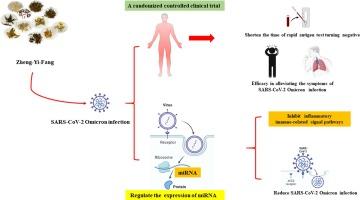Herbal-based tea bag reduces SARS-CoV-2 variant symptoms and infection duration via microRNA regulation: Clinical and mechanistic insights
IF 3.8
2区 农林科学
Q2 FOOD SCIENCE & TECHNOLOGY
引用次数: 0
Abstract
Objective
MicroRNAs (RNA) are crucial in combating SARS-CoV-2; Some traditional Chinese herbal formulas (CHF) have shown potential against the original SARS-CoV-2 strain but no research explores CHF’s role in regulating microRNAs to combat the virus. This study aimed to investigate whether a herbal-based tea bag, Zheng-Yi-Fang (ZYF), from the modified combination of Jie-Geng-Tang (桔梗湯) and Huopu-Xia-Ling-Tang (藿朴夏苓湯) with Houttuynia cordata and Scutellaria baicalensis, can alleviate mild SARS-CoV-2 variant symptoms through microRNA regulation.
Methods
Patients with SARS-CoV-2 were recruited via telemedicine services at Taipei Veterans General Hospital from August to December 2022. Participants were randomly assigned to the ZYF group or a control group receiving standard Western medicines for symptom relief. Efficacy was evaluated by clinical symptom scores and the duration for positive antigen results to turn negative. Additional assays assessed spike protein fusion, viral main protease (Mpro) activity, IL-6/IL-8 secretion, and miRNA induction.
Results
ZYF demonstrated efficacy in alleviating the symptoms of SARS-CoV-2 variants infection in the nasal, throat, upper respiratory areas, and gastrointestinal tract, while reducing the time required for positive antigen results to turn negative. ZYF inhibited spike protein fusion, regulated miRNA-98 to decrease ACE2 and TMPRSS2 expression, and inhibited Mpro activity. ZYF also modulated miRNA-146a expression, reducing IL-6/IL-8 secretion.
Conclusions
Our findings suggest that the herbal-based tea bag offers a novel antiviral approach against SARS-CoV-2 variants by modulating miRNAs, reducing viral entry and IL-6/IL-8 secretion, and inhibiting Mpro activity.

草药茶包通过微RNA调控减少SARS-CoV-2变异型症状和感染持续时间临床和机理研究
目的微RNA(RNA)是抗击SARS-CoV-2病毒的关键;一些传统中药配方(CHF)已显示出抗击SARS-CoV-2病毒原始株的潜力,但还没有研究探讨CHF在调节微RNA以抗击病毒方面的作用。本研究旨在探讨由桔梗汤、藿朴夏苓汤与鱼腥草、黄芩改良组合而成的中药袋泡茶--正一方(ZYF)能否通过调节微RNA缓解轻度SARS-CoV-2变异型症状。方法2022年8月至12月,台北荣民总医院通过远程医疗服务招募SARS-CoV-2患者。参与者被随机分配到ZYF组或接受标准西药缓解症状的对照组。疗效通过临床症状评分和抗原阳性结果转阴的持续时间进行评估。结果ZYF能有效缓解SARS-CoV-2变异体感染鼻腔、咽喉、上呼吸道和胃肠道的症状,同时缩短抗原阳性结果转阴所需的时间。ZYF 可抑制尖峰蛋白融合,调节 miRNA-98 以降低 ACE2 和 TMPRSS2 的表达,并抑制 Mpro 的活性。结论:我们的研究结果表明,草药茶包通过调节 miRNA、减少病毒进入和 IL-6/IL-8 分泌以及抑制 Mpro 活性,为抗击 SARS-CoV-2 变体提供了一种新的抗病毒方法。
本文章由计算机程序翻译,如有差异,请以英文原文为准。
求助全文
约1分钟内获得全文
求助全文
来源期刊

Journal of Functional Foods
FOOD SCIENCE & TECHNOLOGY-
CiteScore
9.60
自引率
1.80%
发文量
428
审稿时长
76 days
期刊介绍:
Journal of Functional Foods continues with the same aims and scope, editorial team, submission system and rigorous peer review. We give authors the possibility to publish their top-quality papers in a well-established leading journal in the food and nutrition fields. The Journal will keep its rigorous criteria to screen high impact research addressing relevant scientific topics and performed by sound methodologies.
The Journal of Functional Foods aims to bring together the results of fundamental and applied research into healthy foods and biologically active food ingredients.
The Journal is centered in the specific area at the boundaries among food technology, nutrition and health welcoming papers having a good interdisciplinary approach. The Journal will cover the fields of plant bioactives; dietary fibre, probiotics; functional lipids; bioactive peptides; vitamins, minerals and botanicals and other dietary supplements. Nutritional and technological aspects related to the development of functional foods and beverages are of core interest to the journal. Experimental works dealing with food digestion, bioavailability of food bioactives and on the mechanisms by which foods and their components are able to modulate physiological parameters connected with disease prevention are of particular interest as well as those dealing with personalized nutrition and nutritional needs in pathological subjects.
 求助内容:
求助内容: 应助结果提醒方式:
应助结果提醒方式:


